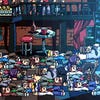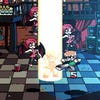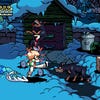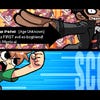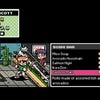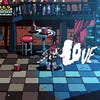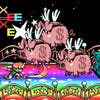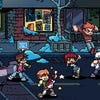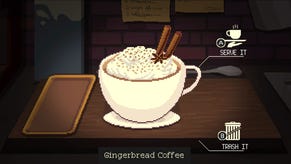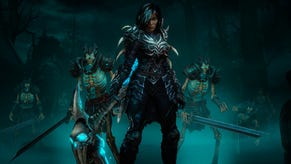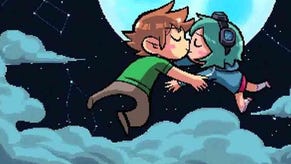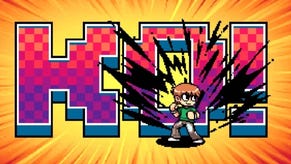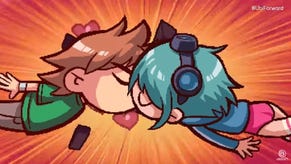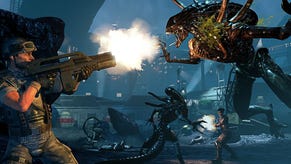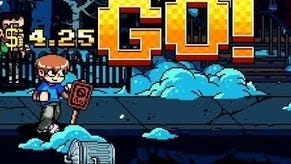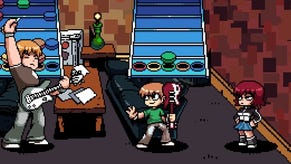Scott Pilgrim vs. The World
The bob-omb?
Scott Pilgrim is one of us. While Hollywood's zeitgeist-chasing writers and directors clutch at game references in an effort to appeal to those born into videogames, Scott Pilgrim out-nerds even the medium's firstborn by knowing the bass line to Final Fantasy II off by heart. Aged 16, he joined a three-piece indie band called Sonic and Knuckles in an effort to transcend his non-jock plebeian school status. He owns a Mithril Skateboard (+4 to Speed, +3 to Kick, +1 to Will), plays Tony Hawk to train, Bomberman to relax and saves tiny worlds on a daily basis.
His worldview is filtered through a Nintendo lens: health measured in Zelda sprite hearts, cans of soda replenishing HP in quarter increments. Girls are won by defeating boss-fight personifications of their issues. When Scott does battle, his puny, cathode-tan arms are transformed into Street Fighter weapons, his body all suspension-wire fly-kick shapes, silhouetted against a scrolling parallax sunset.
Scott Pilgrim daydreams in videogame verbs. He is one of us.
And therein lies the problem with his game. Despite looking like one of us, despite speaking our language and making references that only we could ever understand, Scott Pilgrim nevertheless represents some uncomfortable things about the state of gaming today. Ubisoft-licensed, it is the videogame of the movie of the comic book, its very existence reinforcing the idea that games are no more than a third-tier advertising revenue stream filled with product precision-timed to support the box office.
Viewed ungenerously, Scott Pilgrim vs. The World is as much an example of adver-gaming as so many Watchmen, Transformers and James Bond tie-ins have been before it. Just because its protagonist is one of us doesn't necessarily mean his game shares the same hopes and dreams for the medium as us. Does it?
"Winners Don't Eat Meat".
The parody of FBI Director William S. Sessions' "Winners Don't Do Drugs" slogan, seen at the start-up of all American videogame arcade machines in the nineties, is the first thing you see in Scott Pilgrim vs. The World: The Game. It's a simple joke that speaks volumes. All six volumes of the Scott Pilgrim comic books, in fact; it's evidence that developer Ubisoft Montreal has digested every page of Bryan Lee O'Malley's lifework, and is confident to kick off with a joke entirely absent from the paperback series, and yet entirely in keeping with its spirit.
From thereon in, the knowing delights combo upwards: Paul Robertson's effortless pixel art captures the essence of the 8- and 16-bit Japanese scrolling beat-'em-ups the game apes, while Anamanaguchi's cute/dramatic/cute brand of chiptune soundtracks every flurry of punches with Casiotone arpeggios.
It's the attention to detail that's gone into this Final Fight clone that elevates it above a predictable movie tie-in. The world of the comics has been recreated in fine detail, each of the four (initially) playable characters –Scott, Kim Pine, Steven Stills and Ramona Flowers – communicating a great deal of their on-page personality in a handful of effective sprite animations. There are ten thousand in-jokes for fans of the books, the game offering players the chance to pay back Scott's video rental fine ($504.25) or to eat vegan food to replenish health.
Likewise, where the books celebrate formative Japanese gaming culture, so the game contains endless micro-tributes to yesterday's gaming landscape, from the obvious Super Mario World level select hub, to more subtle flourishes such as the Triforce symbols painted on the side of recycling bins or the choice of pale Earthbound text box colours in the shops.
In play, the game is a competent brawler. Two attack buttons, fast and strong, can be combined with jumps and blocks to thread together long, exciting combos. A fast dash (executed with a double tap of the directional input) allows you to knock an enemy backwards into the air, dash in to keep apace with them, and continue the juggle.


